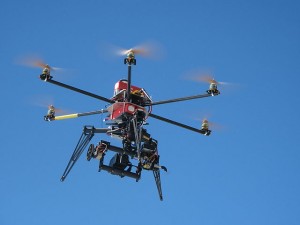
In an age when people are increasingly concerned about government’s use of various forms technology to spy on them, the Court of Appeals has signaled that there will be limits to police use of such technology.
Last week, in an important expansion of New Mexico’s departure from the U.S. Supreme Court’s Fourth Amendment jurisprudence, the Court of Appeals held in State v. Davis that aerial surveillance by police constitutes a search requiring a warrant, or an exception to the warrant requirement.
This case is something of a saga. In 2006, a police helicopter spotted marijuana plants in the 72-year-old Mr. Davis’ greenhouse. Heavily armed law enforcement officers carrying A-15 semi-automatic weapons confronted Mr. Davis and asked for his consent to search the premises, while a police helicopter hovered overhead and police vehicles surrounded his property. Mr. Davis “consented,” and the search revealed marijuana plants.
Although it would be hard to imagine anyone feeling perfectly free to refuse the officers’ request, the New Mexico Supreme Court nevertheless held that Mr. Davis voluntarily consented to the search. (See my earlier post on that decision). This case has also attracted criticism from Drug War opponents due to the military-style nature of the raid on Mr. Davis’ property.
While Mr. Davis lost that battle, it now seems he may have won the war. The Court of Appeals, in an opinion by Judge Cynthia Fry, has held that the aerial surveillance of Mr. Davis’ property was a search requiring a warrant, or an exception to the warrant requirement. And because Mr. Davis’ consent to the search was not sufficiently attenuated from the illegal search, the Court ordered the evidence suppressed.
Under the Fourth Amendment, aerial surveillance does not require a warrant where it is conducted from a public vantage point, in a physically non-obtrusive manner, and reveals something the property’s occupant has not protected from the sight of anyone flying overhead.
Judge Fry explained that the New Mexico Constitution provides greater protection to the public than the Fourth Amendment, and rejected the Fourth Amendment analysis for two reasons. First, surveillance by police is qualitatively different from observations made by members of the flying general public.
Second, the level of physical intrusion does not matter because what counts is the “visual intrusion from targeted, warrantless surveillance police aerial surveillance, no matter how quietly or cleanly the intrusion is performed.” The Court notes that “it is likely that ultra-quiet drones will soon be used commercially and, possibly, for domestic surveillance.”
Instead, the Court held that aerial surveillance is a search if (1) “law enforcement personnel have the purpose to intrude and attempt to obtain information from a protected area, such as the home or its curtilage,” that (2) “could not otherwise be obtained without physical intrusion into that area.”
In my opinion, this decision is very much a step in the right direction, and anticipates the increasing use of drones by law enforcement that we’ll likely see over the next decade. Given my libertarian tendencies, I always like to see restrictions on the government’s ability to spy on people.
But please fee free to leave a comment if you disagree. Is it reasonable to require police to close their eyes to a marijuana farm, or other criminal activity, on a piece of land that any member of the public could see by flying overhead? Are there any negative consequences that could flow from requiring a search warrant to observe what’s open to view from above? Or did the Court do the right thing here?
(UPDATE: January 21, 2014): This latest decision has also attracted media attention. See this television report by Caleb James of KOB Eyewitness News, which also references the efforts by State Senator Jerry Ortiz y Pino to legalize marijuana in New Mexico, and this report by Andy Stiny in the Albuquerque Journal).

One Response to New Mexico Court of Appeals holds that aerial surveillance by police constitutes a search requiring a warrant